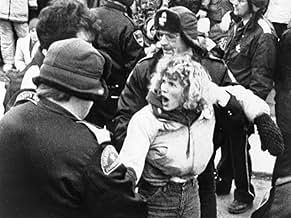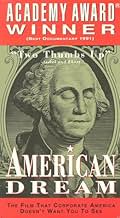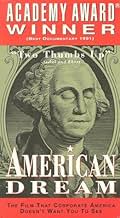IMDb RATING
7.8/10
1.1K
YOUR RATING
Recounts the 1985-86 strike against the Hormel Foods Corporation in Minnesota after its employees' wages and benefits were cut.Recounts the 1985-86 strike against the Hormel Foods Corporation in Minnesota after its employees' wages and benefits were cut.Recounts the 1985-86 strike against the Hormel Foods Corporation in Minnesota after its employees' wages and benefits were cut.
- Won 1 Oscar
- 12 wins & 3 nominations total
Dan Rather
- Self
- (archive footage)
Ronald Reagan
- Self
- (archive footage)
Featured reviews
It may at times resemble an illustrated Bruce Springsteen protest ballad, but the tragedy in Barbara Kopple's Oscar winning documentary portrait of a Minnesota meat packer's strike is too rich to ignore, not unlike the film 'Roger & Me' but without Michael Moore's self-serving humor. The story begins in the mid 1980s, when the Hormel Company in Austin, Minnesota, tried to lower wages despite showing a healthy profit, leading members of Local P-9 to ignore their parent Union and hire an rhetoric spouting outside agitator (labor 'consultant' Ray Rogers), who transformed their grievance into a noble but ultimately self-defeating grassroots crusade. Kopple herself remains more or less invisible throughout the film, but her sympathy for the renegade P-9 underdogs (and her anti-Reaganomics attitude) is obvious, and she reveals the personal and civic consequences of labor disunion with heartbreaking clarity. The strike itself may not have made headlines outside the Mid West, but the story has some devastating implications for organized labor nationwide, and beyond that supplies enough drama and character to match any Hollywood blockbuster.
"American Dream" is a sobering and fascinating documentary depicting the social, economic and emotional ramifications of a labor strike initiated by employees at a Hormel meatpacking plant in Austin, Minnesota. Although the film depicts events that take place in 1986, the content is every bit as relevant today on the subject of the perennial gap that exists between rank-and-file workers and top executives at major U.S. corporations, and the general greed and mercenary attitude that drives said corporations at the expense of hard-working employees. Like "Roger & Me," the acclaimed documentary by Michael Moore that savaged General Motors and the 80's corporate ethos of "profits above everything else," "American Dream" is a priceless portrait of blue-collar work and life in small-town America, the kind of place that people who live in New York, Washington D.C., Los Angeles or any other major metro area will probably never see.
Austin is a town where one company is the largest employer (in this case, the Hormel meat company), on whom generations of workers depend for their livelihood. The film puts a human face on the repercussions that result when Hormel, despite record profits, cuts the salaries of its workers. If the balding, grey-suited, humorless Hormel executives depicted here (wearing huge eyeglasses in the style of Lee Iaccoca) are not the epitome of 80's greed, I don't know what is. They are Gordon Gekko come to life, caring only about their bottom line and how to maximize profit, completely indifferent to the plight of their workers. The Enron debacle shows that, for all their economic might and wealth creation, there is a dark side to corporate America. "American Dream," its ironic title aside, is a journey to that dark side that should be seen by every worker, blue-collar or white-collar. Try to catch it on the Sundance or Independent Film Channel.
Austin is a town where one company is the largest employer (in this case, the Hormel meat company), on whom generations of workers depend for their livelihood. The film puts a human face on the repercussions that result when Hormel, despite record profits, cuts the salaries of its workers. If the balding, grey-suited, humorless Hormel executives depicted here (wearing huge eyeglasses in the style of Lee Iaccoca) are not the epitome of 80's greed, I don't know what is. They are Gordon Gekko come to life, caring only about their bottom line and how to maximize profit, completely indifferent to the plight of their workers. The Enron debacle shows that, for all their economic might and wealth creation, there is a dark side to corporate America. "American Dream," its ironic title aside, is a journey to that dark side that should be seen by every worker, blue-collar or white-collar. Try to catch it on the Sundance or Independent Film Channel.
American Dream (1990)
**** (out of 4)
Barbara Kopple's Oscar-winning documentary follows a meat packing strike in Austin, MN and those familiar with the director's HARLAN COUNTY, USA will certainly have a lot to compare. This film follows the unions decision to pull their workers after Hormel reported a $29 million dollar profit and then asked their workers to take a pay cut and have their benefits reduced. While this film doesn't reach the same heights as HARLAN COUNTY, there's no question that this here is still a pretty remarkable documentary in its own right. There's no question that Kopple knows how to tell a story and more importantly find the passion, fire and energy of a story and exploit it to make sure the message of those individuals get across for the viewers. The documentary was clearly on the side of the workers as this is where we spend the majority of the running time. The first forty-minutes of the film focuses on the pre-strike as we get to know the main people involved and we get a very good idea of the working conditions in America at the time and it's clear that going on strike is very dangerous for a number of reasons. The final hour of the picture deals with the strike as the workers get dragged along for months and the end results aren't anywhere close to a happy ending. As someone who has worked for a union I can see both sides of the coin but it really does seem that the majority of the people lost here and that's a real shame. Kopple does a remarkable job at telling this story and there's no question that your attention will be glued to the film from start to finish.
**** (out of 4)
Barbara Kopple's Oscar-winning documentary follows a meat packing strike in Austin, MN and those familiar with the director's HARLAN COUNTY, USA will certainly have a lot to compare. This film follows the unions decision to pull their workers after Hormel reported a $29 million dollar profit and then asked their workers to take a pay cut and have their benefits reduced. While this film doesn't reach the same heights as HARLAN COUNTY, there's no question that this here is still a pretty remarkable documentary in its own right. There's no question that Kopple knows how to tell a story and more importantly find the passion, fire and energy of a story and exploit it to make sure the message of those individuals get across for the viewers. The documentary was clearly on the side of the workers as this is where we spend the majority of the running time. The first forty-minutes of the film focuses on the pre-strike as we get to know the main people involved and we get a very good idea of the working conditions in America at the time and it's clear that going on strike is very dangerous for a number of reasons. The final hour of the picture deals with the strike as the workers get dragged along for months and the end results aren't anywhere close to a happy ending. As someone who has worked for a union I can see both sides of the coin but it really does seem that the majority of the people lost here and that's a real shame. Kopple does a remarkable job at telling this story and there's no question that your attention will be glued to the film from start to finish.
I definitely liked this documentary. I usually think of it a little when I see a Hormel product at the grocery store. It was impressively done and it really has an authentic feel to it. For some reason I have not yet seen Harlan County USA, but will certainly do so sometime this year.
I have seen this twice and it is definitely worth more than one viewing. While the tone starts as pro-union, there seems to be at least some hints about their limitations as well later in the film. I spent my childhood in a town nearly 100 miles north of Austin and the film made me appreciative that my father had access to more opportunities when he got laid off (we were much closer to the Minneapolis region than Austin). I could feel for the families of those in Austin during this film as it was primarily a one company town at that time and for all I know it may still be the case.
Documentaries work best when there is a focus on "real" people rather than well known celebrities IMO. This is evidence of that and I recommend this film.
I have seen this twice and it is definitely worth more than one viewing. While the tone starts as pro-union, there seems to be at least some hints about their limitations as well later in the film. I spent my childhood in a town nearly 100 miles north of Austin and the film made me appreciative that my father had access to more opportunities when he got laid off (we were much closer to the Minneapolis region than Austin). I could feel for the families of those in Austin during this film as it was primarily a one company town at that time and for all I know it may still be the case.
Documentaries work best when there is a focus on "real" people rather than well known celebrities IMO. This is evidence of that and I recommend this film.
I was raised in a beef slaughtering plant family in Northeastern Colorado. My father was a member of UFCW Local 7 for many years as well as my brothers and my mother. Watching this movie brought back memories of how life was during strike time. I will hand it to Kopple, about catching the true realities of a plant family on strike. The scenes of the negotiation teams and plant management were excellent, since I didn't get to see what happens behind closed doors, there were guys that told me, but it really hits home when you see it. The scenes of the slaughter, even though my family worked in beef plant and this was a hog plant, I could hear the noise and smell the smells and oddly enough, it was like being back home. This movie brought some tears to my eyes and some bittersweet memories...please e-mail if you have any questions about what life is like on strike...
Did you know
- How long is American Dream?Powered by Alexa
Details
- Release date
- Countries of origin
- Official site
- Language
- Also known as
- Американская мечта
- Filming locations
- Production companies
- See more company credits at IMDbPro
Box office
- Gross US & Canada
- $269,823
- Opening weekend US & Canada
- $9,291
- Mar 22, 1992
- Gross worldwide
- $269,823
Contribute to this page
Suggest an edit or add missing content






















